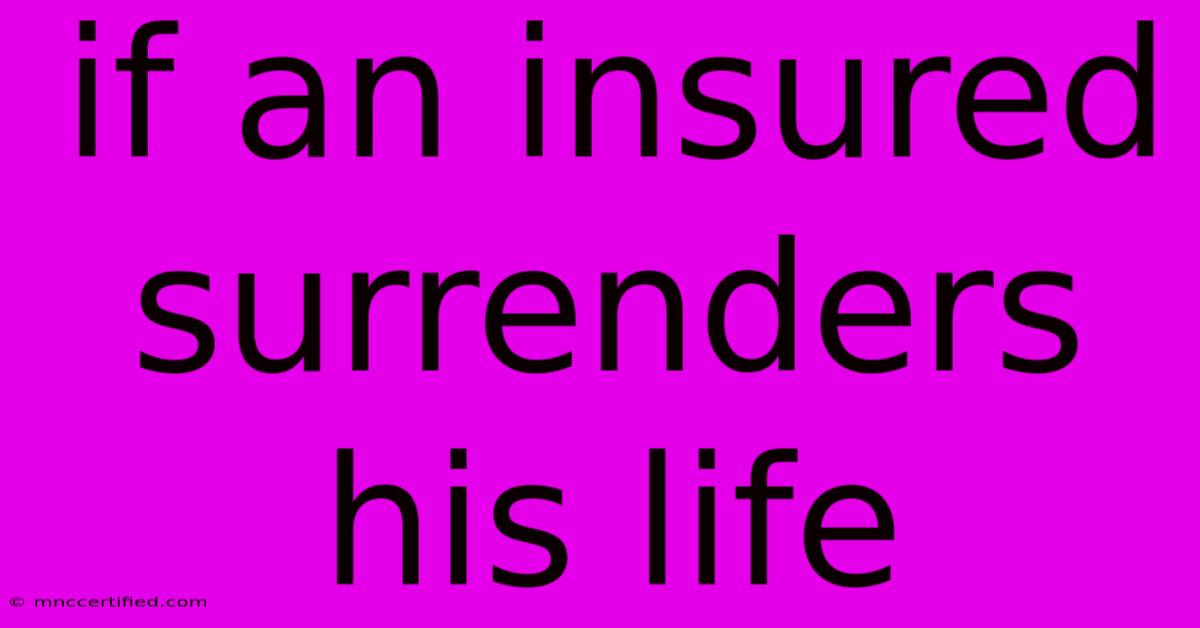If An Insured Surrenders His Life

Table of Contents
What Happens to a Life Insurance Policy if the Insured Dies?
Life insurance is designed to provide financial security for your loved ones after your death. But what exactly happens to the policy when the insured individual passes away? This comprehensive guide will explore the process, key considerations, and frequently asked questions surrounding the surrender of a life insurance policy upon death. We'll cover everything from claim processing to beneficiary designations and potential tax implications.
Understanding the Claim Process
When the insured dies, the beneficiary (or beneficiaries) named on the policy must initiate a death claim. This typically involves:
- Obtaining a death certificate: This is the crucial document proving the death of the insured. Ensure you obtain certified copies, as some insurers may require multiple copies.
- Contacting the insurance company: Reach out to the insurance provider as soon as possible. They will guide you through the necessary steps for filing a claim.
- Providing required documentation: Beyond the death certificate, the insurer might request additional documents, such as the policy itself, proof of identity for the beneficiary, and potentially medical records (depending on the circumstances of death).
- Claim review and approval: The insurance company reviews the submitted documentation to verify the claim's validity. This process can take time, varying depending on the insurer and the complexity of the case.
- Payment of benefits: Once approved, the insurance company will disburse the death benefit to the designated beneficiary, usually through a lump-sum payment.
Types of Life Insurance Policies and Claim Procedures:
The specific claim procedures might vary slightly depending on the type of policy. Common types include:
- Term Life Insurance: Provides coverage for a specified period. The claim process is relatively straightforward, focusing on verifying death and beneficiary information.
- Whole Life Insurance: Offers lifelong coverage and builds cash value. The claim process is similar to term life insurance, but may include considerations for the cash value component.
- Universal Life Insurance: Combines life insurance with a cash value component, offering flexibility in premiums and death benefits. Claim processes are generally similar to whole life insurance.
Beneficiary Designations: A Crucial Aspect
The beneficiary designation is critical. It determines who receives the death benefit. Common beneficiary designations include:
- Primary Beneficiary: The person who receives the death benefit first.
- Contingent Beneficiary: The person who receives the death benefit if the primary beneficiary predeceases the insured.
- Revocable Beneficiary: The insured can change the beneficiary designation at any time.
- Irrevocable Beneficiary: The insured cannot change the beneficiary designation without the beneficiary's consent.
Choosing the right beneficiary is crucial to ensure your wishes are followed. Review and update your beneficiary designations regularly to reflect changes in your personal circumstances. Consider using a trust as a beneficiary for added control and asset protection.
Tax Implications of Life Insurance Death Benefits
Generally, life insurance death benefits are received tax-free by the beneficiary. However, there are exceptions. For example, if the policy was transferred for valuable consideration or used in a business context, tax implications might arise. Consult with a tax professional to understand the specific tax implications in your situation.
What if the Policy Lapses Before Death?
If the insured stops paying premiums and the policy lapses before death, no death benefit will be paid. It's essential to maintain premium payments to keep the policy active. Consider exploring options like loan provisions if facing financial difficulties rather than allowing the policy to lapse entirely.
Frequently Asked Questions (FAQs)
- Q: How long does the claim process take? A: The timeframe varies, but generally ranges from a few weeks to several months.
- Q: What if I can't find the policy documents? A: Contact the insurance company immediately; they can help you locate the necessary information.
- Q: Can I change my beneficiary after the policy is issued? A: Yes, generally you can, unless you've designated an irrevocable beneficiary.
- Q: What happens if there's no designated beneficiary? A: The death benefit will typically go to the insured's estate, which could lead to probate delays and potential estate taxes.
This information is for general guidance only and should not be considered legal or financial advice. Always consult with professionals for personalized advice based on your specific circumstances. Proper planning and understanding of your life insurance policy are critical to ensuring your loved ones are protected after your passing.

Thank you for visiting our website wich cover about If An Insured Surrenders His Life. We hope the information provided has been useful to you. Feel free to contact us if you have any questions or need further assistance. See you next time and dont miss to bookmark.
Featured Posts
-
November 24th Seahawks Food Drive
Nov 19, 2024
-
Broncos Defeat Yotes 4 0 Record
Nov 19, 2024
-
Radio 2 Schedule Nelson Replaces Mills
Nov 19, 2024
-
San Marino Vs Liechtenstein Match Preview
Nov 19, 2024
-
House Of Games Willans Episodes
Nov 19, 2024